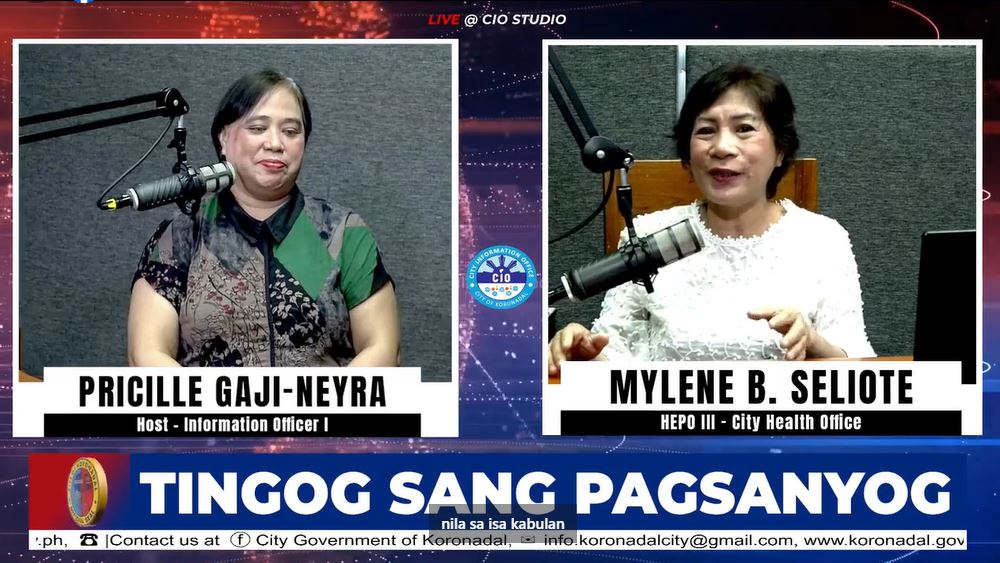CHO conducts month-long MR-SIA starting May 2

The Koronadal City Health Office (CHO) officially launched the Department of Health’s (DOH) month-long nationwide measles and rubella supplemental immunization activity today, May 2, 2023.
The vaccination activities will be conducted in various barangays health stations and in the City Health Center. Immunizations will also be scheduled in some areas, like malls, public terminals, public markets, and churches. The CHO also considered to hold a house-to-house vaccinations especially in the remote puroks and sitios in the city.
In an interview with Mylene Siliote, the CHO’s Health Education Promotion Officer (HEPO) III, she urged the parents with children ages zero to fifty-nine (59) months old or nine (9) months old and below the age of five (5) years old, to have their children vaccinated to prevent measles, or “tigdas” rubella, commonly known as “makayha”, and polio, which are considered as “vaccine preventable diseases.”
“Nakatutok kita sa sakit nga Measles, Rubella, Oral Polio Vaccines (MS-OPV) kay nakita sang Epidemiology and Surveillance Unit sang DOH nga ang trending sang outbreak sa sakit sa MS-OPV kada apat ka tuig. Ang last nga outbreak sa Pilipinas is last 2019, before sang pandemic. Ang four years from 2019, karon nga tuig 2023 is on the fourth year na.”
(We are focusing on measles, rubella, and oral polio vaccines (MS-OPV) since the Epidemiology and Surveillance Unit of the DOH found out that the trend of the MS-OPV outbreak is every four years. The last outbreak in the Philippines was in 2019, before the start of the pandemic, and we are currently in our fourth year this year.) Siliote said.
Further, she assured the parents that they should not have to worry about the vaccines as they are definitely effective and very safe for their children.
Measles, or “tigdas,” is one of the most contagious diseases not only in the country but in the whole world. Nine out of 10 children who have not undergone immunization will have a big chance of contracting the disease. It can cause high-grade fever. rashes, coughing, eye infections, which can lead to complications such as pneumonia, ear infections, blindness, severe diarrhea, and swelling of the brain.
Polio, on the other hand, is a potentially disturbing disease that causes fever, neck stiffness, and muscle weakness and can eventually lead to lifelong paralysis.
If severe enough, both diseases can ultimately lead to death. As of the moment, there is still no specific treatment for these illnesses. The only reliable protection is through vaccination.
However, the newly-appointed HEPO clarified that this time there will be no oral polio vaccination in the province of South Cotabato because the DOH will be prioritizing those towns and provinces in the region with high and confirmed cases of polio.
“May information kita nga ang South Cotabato indi manghatag sang polio vaccine. May cases kita sa iban nga region, may cases sa iban nga provinces, may taas sila nga confirmed cases sang polio kag didto anay nagsentro ang pagpanghatag sang polio vaccines.”
(We received information that no polio vaccines will be given in South Cotabato. There are cases in the region, in other provinces, that have confirmed high polio cases; thus, they will be given priority to avail of these polio vaccines.) Siliote revealed.
Meanwhile, South Cotabato has recorded one (1) case of rubella disease. To avert a possible measles outbreak this year, the CHO is intensifying its campaign against these two contagious diseases, measles and rubella.
She also called for the support of the private sector and non-governmental organizations, particularly the media, to help them properly disseminate information about the on-going vaccination activity.
Finally, Siliote has these words highlighted, “We are one in this fight, and our ultimate goal here is that, no child should be left behind.”